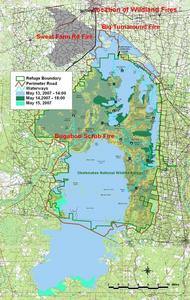 Regarding the
Georgia and Florida swamp and pine fires,
one of the main questions is at what point does
preservation offer greater economic gain than resource extraction.
Looking at the big picture brings out two points:
Regarding the
Georgia and Florida swamp and pine fires,
one of the main questions is at what point does
preservation offer greater economic gain than resource extraction.
Looking at the big picture brings out two points:
ActionBioscience.org: The figure "$33 trillion" was once projected as
the value of ecosystems globally. What do you think of this type of
economic analysis?
Polasky: The $33-trillion figure refers to one of the earliest studies
that was done on the value of ecosystem services. The lead author was
Robert Costanza. He and his coauthors tried to get at the notion of how
we can establish on a global basis what the value of ecosystem services
is. They came up with a number 33 trillion [USD] plus or minus a few
trillion. There are a number of problems with the study. The most basic
one is the question of what you are talking about when you consider all
the ecosystem services of Earth. The entire system is our life support
system. So what is our life support system worth? You don’t really
have to have a scientific study in order to answer that question. The
real value of the study was not the $33-trillion figure, which who knows
what that means, but that it spurred people to focus on these issues.
Such values can be big, and the dollar value isn’t the only consideration.
There is a bit of risk in that we can’t do without the biosphere,
and some risk management is in order.
Even beyond that obvious non-dollar value,
there are further questions of species diversity and esthetics.
Do we really want to kill off an ecosystem when we don’t really know
what it’s doing for us,
and do we all want to live surrounded by concrete?
Continue reading →
 Somebody’s been paying attention to global warming and wildfires:
Somebody’s been paying attention to global warming and wildfires:


 Fox News discovers
Fox News discovers




 I’m having a little difficulty finding historical statistics on wildfires.
Here’s someone’s understanding:
I’m having a little difficulty finding historical statistics on wildfires.
Here’s someone’s understanding:
